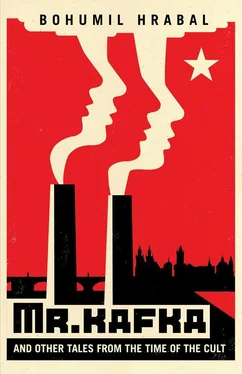And then I turned and saw that some members of the symphony audience were climbing up all three ladders through the aviary, and then the dancers in the brewery courtyard started bringing up ladders and leaning them up against the wall and pushing their way up, and it was like those pictures you see of castles under siege, they were glaring at each other as though some unseen conductor were directing them, and now they were standing on top of the wall, and I saw them close in on each other, their eyes flaming with hatred, and they began swinging at each other, and several of them stumbled and plunged down off the wall, but I was already somewhere else, I could no longer acknowledge the truth of either side with my fists so I tore off a small branch and began conducting both orchestras, and Mr. Polata’s band began to play With Lion’s Strength the Falcon Soars , and the waitresses quickly cleared the beer off the tables, and the shadow of a falling body would flit past, and they were all so united by passion that more of them climbed up the ladders, and by now the top of the wall was jammed not just with sandstone statues but with brawlers as well, some of them so beside themselves with rage they began wrestling with the statues, and the Prague Municipal Symphony Orchestra stopped playing and those musicians ran under the branches of the ancient trees and Mr. Polata’s band stopped playing as well and those musicians crowded round at the foot of the wall, some of them climbing up the ladders, and on the other side of the wall, the symphony musicians did the same, bringing their instruments with them, so that now there were instruments as well as people on the wall, and the musicians began to fight, their shiny instruments flashing back and forth, tearing down branches, and it was strange to see trumpets and euphoniums going at each other, and clarinets fencing with clarinets, and every once in a while a body would plummet off the wall, but that didn’t stop admirers of Mr. Polata’s music from gathering down below, and on their side of the wall, fans of the Prague Municipal Symphony Orchestra did the same, all shaking their fists at one another and shouting while they made room for Mr. Polata himself to climb up the ladder on one side and Mr. Smetáček on the other, so they, too, could have a go at each other. But then, amid wailing sirens, a milk-white police car swerved into the brewery courtyard and another nosed through the gates of the Waldstein Gardens, as if they had given each other a signal, or had taken their directions from my baton, but by then the melée on top of the wall was so intense that someone grabbed me and shoved me, but I managed to hang on to his coat, and it was a fan of Mr. Polata’s music, and he fell down into the Waldstein Gardens, and at the same time I flew headfirst, arms spread wide, down into Mr. Polata’s orchestra and crashed into the drum set, then toppled over into the slippery pool of saliva the trombonist had blown out of his instrument. .. The cops leaped out of their squad cars, and, as if on command, the old ladies on the second and third floors flung open all the windows, and reflections from the glass flitted across the sky, across the walls and the upturned faces, and in that strange, pallid light I saw everything and heard everything, and I was in harmony with everything and accepted everything and the old ladies were shouting over each other, flailing their bony arms and yelling, “Down with big-breasted women! Lock them up! Chop off their hands! Rip out their tongues! Set the gelders and castrators on them!” And forever after I was a rotten ticket taker and a rotten organizer because, after everything I’d seen and heard today and yesterday, I had kicked my way through a drum and come out somewhere on the other side, because I saw everything as if it were wrapped in a single enormous bundle. Only my idiot brother-in-law was sitting backwards on his chair, wagging his finger and pointing at people and saying: “I’d give that one a passport, but not this one; I’d let this one travel abroad, but not that one.” And the brawl on the wall crescendoed, and clusters of brawlers came tumbling down, and they were so wedged in together that they fought without knowing why anymore, and when the lamps turned out, they no longer knew who they were fighting with. There were only bodies falling in the dark and there was the sound of wailing… but I was in harmony with everything and I was saved, too, but lost in a way as well… but I think this will probably be my salvation. ..
Whatever became of that blind man who sold newspapers outside Masaryk Station? Where did he go? He’d stand there peddling his wares, and when a cold wind blew he’d rifle through his papers like a rotary press spilling out pages while pedestrians leaning into the blast would pass him by, averting their eyes from the sight of the blind man battling the wind for possession of his wares, the pages flipping over like leaves on a daily calendar. Whatever became of that blind man? Where did he go?
And what about that cripple on Wenceslas Square? Whatever became of him? He’d sell his mechanical toys on the sidewalk outside Čekans, winding up a little metallic beetle, releasing it into the air, and catching it again in his outstretched arms. Sometimes, when he’d have to chase the toy under the linden trees lining the square, he looked as though he were wading in cobblestones up to his waist, since both his legs had been amputated at the hip, leaving him nothing to fasten artificial limbs to. Where did that cripple go? Whatever became of him?
And what about the woman whose feet were amputated above the ankles? Whatever became of her? She’d walk around Prague as if on her knees and she wore men’s galoshes backwards. After a fresh snowfall, I’d see her approaching from St. Havel’s though trackless snow, and from her footprints, it looked as if she’d been walking beside me, though she was heading in the opposite direction. Wherever did that woman go?
Often these days I see a large star and think it must be the Evening Star, but it’s a tongue of flame from a welder’s torch, a wistful little blue flame, the Holy Spirit descending and flaring red when it touches iron. I open a window of the factory hall and watch the fellow on top of a heap of wartime scrap, holding the bright star tightly between his fingers as he pulls the rubber hoses behind him, the burning jet spewing Christmas-tree sparklers.
At the Poldi steelworks, hopeless people hold their muddied hopes aloft. Life, strangely enough, is constantly being reinvented, and loved, even though a tinfoil brain will bring forth crumpled images, and a trampled torso will ooze misery. And yet, it is still a beautiful thing when a man abandons his three square meals a day and his adding machine and his family and goes off to follow a beautiful star. Life is still magnificent as long as one maintains the illusion that an entire world can be conjured from a tiny patch of earth. When a volunteer laborer has a hundred days left in his stint, he buys a yellow folding ruler and snips off a centimeter a day. When the final piece slips from his fingers, he passes through the neck of a bottle on his way to somewhere else, to encounter another adventure.
But beautiful Poldi is also a volunteer laborer’s scream that tears to shreds all the signs and slogans, three crowns fifty per hundred grams, because you return to the depths of your brain to study the bill to see what you’ve bought and why you’ve paid so much, because the man who turns his hand to fruitful labor is saved forever. Life is fidelity to the beauty exploding all around us, even, at times, at the cost of our own lives. The newspapers, meanwhile, publish glowing accounts of the volunteer laborer who comes home from work and dances the Cossack Dance while sending mental telegrams of gratitude to the authorities, whereas in reality he coughs up black bile and collapses into his bed. Or a thirsty drop of molten steel swims through a roller’s eye, his wife’s image vanishes, and he tries, with ludicrous little steps, to dance away from his misfortune. Progress dines at times on roasted youth; a silver ambulance carries off someone with his feet against the glass doors; a crushed arm longs to return to the shape it once had; and what hurts most about a severed leg is the toe that has vanished with it.
Читать дальше












